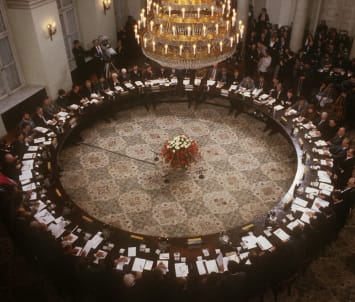Returning to Europe
In February 1989 the government originated talks with the trade union Solidarity in an attempt to resolve growing social tension.

There can be little doubt that the resulting Polish Round Table of 1989 was a major turning point in Polish history. This is where Solidarity and the communist leadership finally hammered out a peaceful compromise that would eventually dismantle the Soviet-style state. It set in train the reconstruction of parliamentary democracy, the introduction of a nascent capitalist order under the Balcerowicz Plan, the resurrection of Polish culture liberated from the deadening hand of the censor, and the revivification of a suppressed society. Eventual NATO membership (1999) and EU accession (2004) was as much about ensuring no return to the embrace of the Soviet-imposed system as it was about taking on the opportunities offered by an open society.
For its part Britain provided assistance and know-how, and gradually opened the door to a trickle of new Polish migrants who looked to the trail of previous migrations. Lech Wałęsa, the figurehead of Solidarity – triumphant and the first president of a free Poland – ushered in a turbulent period of democratic consolidation reminiscent of the interwar years. Whilst the economy grew apace and the country modernized, it inevitably left casualties, the left behind, who would not share in the benefits of the new order. The travails of the great transformation now informed popular culture. Here the humiliations of everyday life in the consumer society felt by the unemployed of the closed factories and mines were recited, sung and portrayed. Poland was back in Europe with all that it now involved.
Text by Professor Jerzy Kolankiewicz
